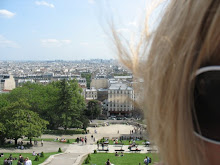I really enjoyed reading “Eurydice.” I even found myself laughing out loud at some points and was quite moved by the end. It is a very magical myth and I appreciate Sarah Ruhl’s ability to playfully manipulate the characters and situation to create a successful play. I can learn a lot from her writing style and mindset (from her interview). First of all, I need to learn to take advantage of the innate theatrics of playwriting and stray away from storylines that are too believable and realistic. Ruhl says, “I don’t tend to write in a realist mode. I’m interested in things that automatically dig you out of that impulse” (31). Perhaps I should take the advice she gave her own students and write a play with a chorus, naturally making it theatrical and forcing it away from the realism I tend towards. I think it would add a lot of life and energy to my plays.
While reading “Eurydice” I enjoyed the fact that I could really visualize the staging of the play the entire time through. Perhaps this stems from her revising so much after watching staged readings and performances of it live. I also appreciate her acknowledgment that the play can be done successfully on a bare stage. Her use of water throughout the play is important to portray well so stage designers have really got their work cut out for them.
Ruhl definitely strayed away from creating a heavy, Greek, classical play. She did this through innocent characters and by manipulating the dialogue so that it is almost always fast- paced and funny. Even the costume choices for the show draw upon a more stereotypically “pure” age, in which traditional gender roles are still honored, etc. Ruhl even writes in distinctive mannerisms for Eurydice, such as always turning her head to one side. While this works to some extent, writers must give actors some liberty. Ruhl’s stylistic choice of overlapping dialogue when the play takes a darker turn is effective. The overlapping and therefore confusing dialogue highlights how both characters are on completely different pages and are not listening to each other.
I was struck by how stylistically or technically smart Ruhl was throughout her writing. For example, her opening scene mirrors the later pivotal moment in the myth with Eurydice playfully saying to Orpheus, “Don’t look at me” (283). This would be an interesting tactic to try in my own writing; it both foreshadows coming events and ties up the story nicely. The over-the-top childlike nature of the couple at the beginning of the play also serves as a nice contrast with their later devastation.
Also, the modes of communication and travel between the earth and the underworld were very clever and comical. The strange details Ruhl added stand out and help make the story even more unrealistic and magical, for example, the fact that the devil is a child riding a red tricycle accompanied by heavy metal music. The straight- forward, childlike language throughout, with all characters except for the father, make the play much more like a dark fairytale. I also found it an interesting tactic to make the norms of one world completely inappropriate in another world, for example, the impulse to stand on a book to know what it says, etc. I also find it interesting that Eurydice becomes happy and accustomed to death and does not want to, or is afraid, to leave the underworld. Exploration of the human psyche under various influences and in various situations is always an interesting one.
The presence of the grandmother is a force that works well throughout to form a cohesive thematic story. Her unnoticed movements in the background add to the confusion and sense of loss in the underworld. I’d like to explore in my own writing the use of a character simply as a reoccurring symbol and not as an instigator of dialogue.
Goals for later- stray away from comfortable realism, play with stylized characters.
